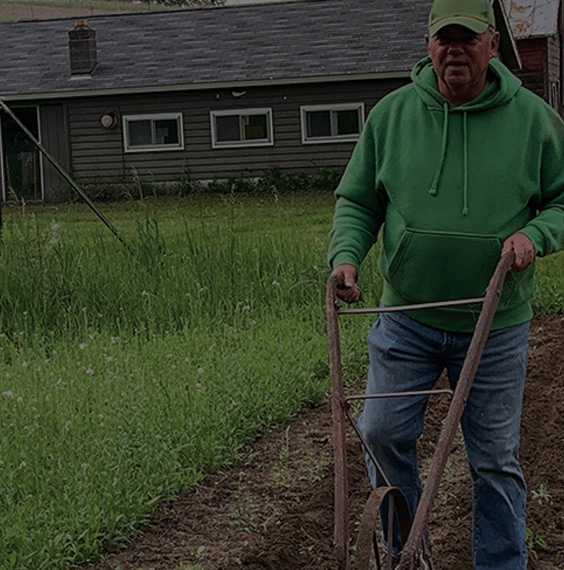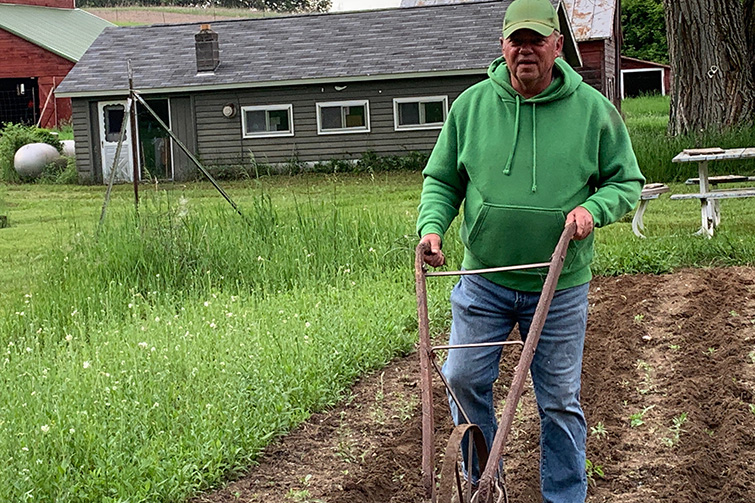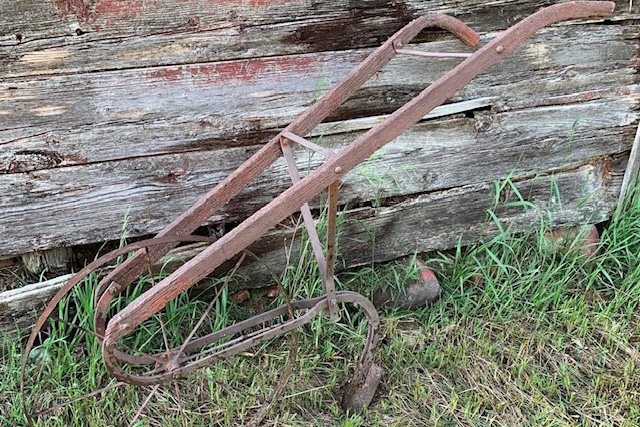

1800s-Era Hand Plow
Keeps Farm Thriving
1800s-Era Hand Plow Keeps Family Farm Thriving
By Grainger Editorial Staff 8/17/22

Brian and Karen Luedtke's family has been farming for generations, going back to the late 1800s on The Nicely Farm in Advance, Indiana. Today, the Luedtkes tend to 140 acres in the heart of Wisconsin farmland in Grand Marsh, located about an hour north of Madison. Working and maintaining a farm takes a lot of love and hard work. And when one tool consistently delivers, it can save significant time and effort. Even though they've tried more modern implements, there's one classic tool Brian relies on every year to plant the vegetable garden—their family heirloom plow.
The Plow’s Origin
"As far as we know," Brian said, "it was something they had either in the late 1800s or the early 1900s, and they used it on The Nicely Farm. Karen's dad, Wayne Nicely, gave the plow to us for our farm. So there's a strong family connection and history."


When they first got the plow, Brian admitted he had no idea how use it. After a little experimentation, he quickly recognized the tool's simplicity and ease of use.
MORE CLASSIC TOOLS: Classic Saw Builds Martha's Vineyard | Vintage Planer Shaped Custom Surfboards
"Being a simple hand plow, its only purpose is to create a furrow," he said. "It’s super lightweight, and the design is really well thought out. The weight is centered ideally over the wheel. So you just push down or lift up depending on how deep you want to plant. If you want to plant deeper, you just push down harder. If you need to plant more shallow, you lift up. It’s that simple. It works exactly how you'd expect."
Newer Isn’t Better
Modern versions of the plow can be found online. These newer tools can create the furrow like the old one, but Brian isn't a fan. The way the new ones are designed, he said, it’s very difficult to control the depth of the furrow. And that’s the most important factor for germination.
"We get better germination and better results when we use the old plow and just walk along and hand plant and use your foot to push the soil back over the seeds," he said.
Today's versions also include a feeder that automatically sows the seed. Then there's a drag chain that covers the seed with soil as you move the plow forward. Despite these changes to the original design, Brian finds the newer versions much harder to use.
"The worst thing, is you'll have patches where you've gone along for maybe 20 feet, and seeds will get jammed and you don't realize it, so no seeds have been planted. And the problem is you can't really tell because the furrow gets covered as you go," he said.
History and Family
"The connection back to the family history and the original settlers on our land reminds us of how things used to be and how much work goes into farming and planting," Brian said. "I go out and push this hand plow and create a one-acre garden and I think about the effort that took. Then compare that to our local farmer, who's maybe farming 10,000 acres of potatoes or corn. Today he's got these massive tractors. It's just unbelievable how tractors and automated planters and all this stuff has changed agriculture.
"This plow is definitely an antique, there's no doubt about it. People who see it want it. All you have to do is park that thing out front and the neighbors come by and stop and want to talk about it. They see it as a prize. It’s a topic of conversation in our little farm neighborhood."
Tell Us About Your Favorite Classic Tool
Do you have a classic tool that you still love to use? Tell us a little about it, and we may feature you and your tool in a future KnowHow® article.
The information contained in this article is intended for general information purposes only and is based on information available as of the initial date of publication. No representation is made that the information or references are complete or remain current. This article is not a substitute for review of current applicable government regulations, industry standards, or other standards specific to your business and/or activities and should not be construed as legal advice or opinion. Readers with specific questions should refer to the applicable standards or consult with an attorney.






